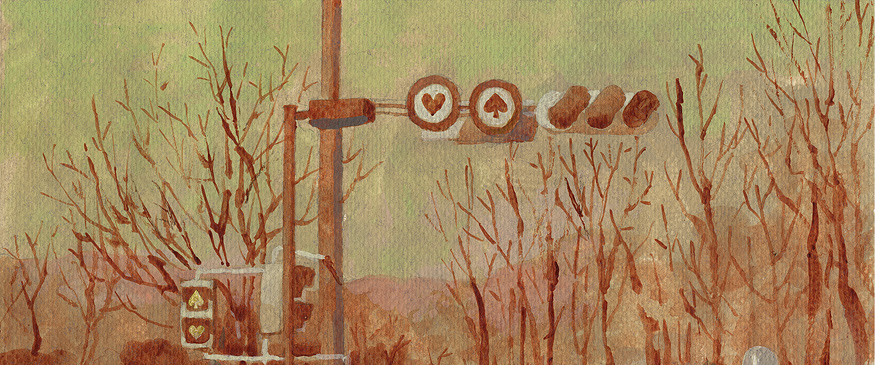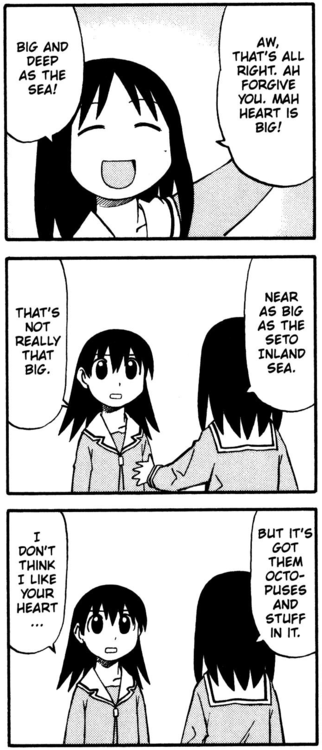-
Content count
187 -
Joined
-
Last visited
-
Days Won
1
Posts posted by whocoulditbe?
-
-
1 hour ago, Daniel said:Thank you. Most people like wikipedia as a first stop for beginning research on a topic. And I'm a fan of crowd source / open source. Often the quality is better.
Can you share your general impression of the 2 articles I linked to?
I'm pretty much a beginner at Chinese, but I understand that Baidu Baike's articles are roughly as good as Wikipedia's outside of political topics, i.e., not very good. The benefit of Baike is that it has more content on Chinese topics, not that that content is better.
-
 1
1
-
-
15 minutes ago, galen_burnett said:you can’t not be aware that that game is played by pretending not to notice nor desire the ‘prey’ (Bliss) so that said prey will be lured unwittingly into your lap whereat it can be snatched… which is just dishonest really at the end of the day.
This metaphor is obviously sharp-edged, but I kind of love it.
-
 2
2
-
-
F. Y. I. Baike is Chinese Wikipedia. It's user generated.
-
 1
1
-
-
56 minutes ago, Vajra Fist said:Tbh the precepts aren't meant as divine commandments, especially outside a monastic context. They're seen as a helpful guide to skillful practice.
This is true, and always brought up when people ask this kind of question. None the less, it can turn out that a guide is more helpful when its instructions are clear to us, and I don't see a lot of clarity in discussions about this precept.
BTW, thanks to this thread, I came across another interesting passage from the 治禪病祕要法 Zhi chan bing mi yao fa ("Secret Essential Methods for Curing Meditation Sickness") trans. Eric M. Greene:
SpoilerFurther, Śāriputra, there may be those among the four groups of Buddhist followers who relish music and take part in musical performances. As a result, their winds will stir. Like unbridled horses, rutting dogs, or royal stags, they sink into deluded attachment. Their minds become like glue, sticking to everything they encounter, unable to be restrained. They must quickly be cured.
The method for curing this is as follows. First imagine a goddess of unparalleled beauty. Various musical instruments that produce thousands of kinds of music appear spontaneously in her hands. The practitioner, seeing this goddess who is hundreds of thousands of times more beautiful than any other material form, and hearing this heavenly music that surpasses any in the world, becomes bewitched as he beholds these forms and hears these sounds.
He must then be taught to contemplate the six sense organs of this goddess. Because of the power of his breath counting, the following confirmatory visions arise. He sees six poisonous snakes appear in her lovely eyes. They go out from her eye organ and into her ear organ. He further sees two creatures that look like rapacious griffins. Letting out a harsh cry they split open her head, pull out her brains, and fight with one another to eat them. He sees a cat, a rat, a dog, and a jackal, who vie with one another to eat her other four organs.
As a result of this, will see the bodies of all women as nothing but the thirty-six foul impure things. Their garlands are like the parasitic worms of the womb. Their musical instruments are like a teeming mass of dung beetles, like groaning wild jackals. He finds their bewitching words utterly repellent, like the cries of demons. He therefore feels revulsion. He should then go to his wise teacher and confess his past evil actions, repenting with utmost sincerity. The wise teacher must then instruct the practitioner in the contemplation of impermanence.
The Buddha said to Śāriputra: “You must remember this method for curing those who delight in music. Do not forget it.” When Śāriputra and Ānanda heard what the Buddha said, they joyfully undertook to carry it out.
The method is basically 1. Associate music with women 2. Hate women 3. Hate music. This passage immediately follows another one describing a method "for curing violations of the precepts!"
-
Does extinction exist? Is absence an object? Does a candle generate darkness after its flame has been extinguished?
-
 1
1
-
-
21 hours ago, Unota said:Sorry to pop in, but somehow, I wound up in the CIA reading room...? I don't know either. Don't ask. I started reading about something else, and somehow ended up on an unclassified document about qigong. But there seems to be a lot of stuff on here about qigong, the first ones I've skimmed are dated in the early 2000's. I think they are due to a rise in it's popularity in the 80's. This is mentioned to be due to a mixing of cultures and western medicine, which seemed to have rejuvenated interest in the practice. I've only glanced through a few of them, because it is already almost 11 at night, and I need to sleep. I'm not sure if they've been shown here before, but I thought maybe Zoya would find it fun to read through them.
https://www.cia.gov/readingroom/search/site/qigong
Who knew they had documents on things like this? I'm so, so tempted to just search in random things, to see what else there is...I'm going to go to bed before I start looking for documents on random things like tree frogs, or solanine derived birth defects from green potatoes.
I'd like to learn more about the politics and history of qigong. But maybe not from the CIA.
3 hours ago, Pak_Satrio said:Anything worth learning won’t come for free.
The Feynman Lectures are free! In seriousness, if you consider Taoism a religion, it's bold to claim that it needs monetary transactions to continue being be transmitted. Ofc. immortality-oriented practice could hardly be meant to convert the masses–society would break down–but it'll have been regulated by other sorts of privilege than money for most of its history, and there have been mass Taoist movements with lesser personal goals than becoming Xian. As for TCM, I'm pretty sure it's still covered by state health insurance in China. But I guess you're talking in context: it's true that when spirituality gets exported around the globe it can end up treated as a product.
-
-
42 minutes ago, Shadow_self said:This is the argument of someone who's biases, fallacies and mental distortions are obscuring even the most basic understanding of what these things actually mean. In other words, someones just looking for an argument to try and reinforce their own false ideas, probably due to some deep unhappiness
You haven't had enough of this already?
-
The final outcome of all semantic debates: both sides fail to think dialectically, the argument goes nowhere, then people become frustrated with the lack of development and begin accuse each other of sophistry. Sigh.
-
 4
4
-
-
Just now, Daniel said:This is so cool. I never thought of it this way.
Just the most immateur thoughts on this, but I would appreciate your feedback?
Double-negation is affirmation? Which is true? Which is a gain? a benefit?
Double-affirmation is.... exaggeration? inflamation? Which is inherently false? The actual is being amplified falsely and harshly?
It's a bad feedback-loop?
I'm mostly referencing the final proposition of the catuskoti (neither is nor is not) but you could also see it in terms of the opposition between the Hegelian negation of the negation and the Nietzschean "affirmation of the affirmation."
-
I think that once you realise that pleasure is complicit in suffering, a new false opposition opens up between the pleasure-suffering compound/cycle and the extinction of both. So, instead of a triangular figure, we have a diamond or catuskoti like this:
nirvana
(double negation)
suffering pleasure
(negation) (affirmation)
samsara
(double affirmation)
Some people respond by "finding happiness in the process," by accepting samsara and enjoying suffering through its interdependence with pleasure. This attitude is exemplified by Romanticism, parts of the Zhuangzi, and much of Nietzsche's writing. The basic premise of Buddhism is more like transcending attachment to pleasure in order to transcend pain, escaping into nirvana. However, whichever approach is chosen, the old opposition ends up projected onto the new, with one pole becoming the new object of seeking. This might be why we frequently end up calling nirvana "pleasure" and samsara "suffering," even though nirvana is neither and samsara is both. So, we end up going at least one step further, realising the emptiness of the distinction between nirvana and samsara.
There is no distinction whatsoever between samsara and nirvana;
and there is no distinction whatsoever between nirvana and samsara.
The limit of nirvana and the limit of samsara:one cannot even find the slightest difference between them.
– Nagarjuna, Mulamadhyamakakarikah Chapter 25
But what comes after this? Nirvana-as-samsara vs. neither-samsara-nor-nirvana? This line of thought could go on forever without bearing much fruit.
-
 1
1
-
-
QuoteThe scamgong section, from the word scam (fraud) and gong (kungfu, art), combines articles and studies, reviews of various trends in pseudo and schizoteric teachings, exposure of personality cults, destructive sects, delusion and ignorance.
The sheer projection
-
Wearing my Immanuel Kant mask: Maybe he's confusing will with inclination?
-
1 minute ago, Michael Sternbach said:In my view, by "following nature" those texts you mentioned primarily suggest following your own nature.
Remember that the Dao is acting not only in the nature that surrounds you but also in your own being.
Can't write 自然 without 自!
-
 2
2
-
-
4 minutes ago, Daniel said:When you get there, don't forget about us mortals, OK?
Yeah, don't go disappearing into the clouds like the rest of them!
-
 1
1
-
 1
1
-
-
If that was happening to me, I'd want to find another person/other people to meditate alongside, so that we could keep each other in check and grounded. On the other hand, that might distract from the meditation, and you may find such a person hard to come if there aren't any dedicated groups in your community.
-
18 hours ago, Unota said:Five will get you ten,
then, ten will spread to thousands,
starting with one seed.
Starting with one seed,
if it ever gave a shoot!
Hogweed-ridden heart.
-
 1
1
-
-
From another thread:
8 hours ago, Gerard said:Not exactly wild but semi-wild:
Aoshima, the Purest Cat Island in the Seto Inland Sea
Came across that site by accident. I had no idea cat islands existed. They are located in Japan.
Reminded me of this masterpiece:
-
 1
1
-
-
5 hours ago, whocoulditbe? said:Interesting idea, but it's troubling to base such a subtle analysis on the English version. In Genesis 2:9, 3:5, and 3:22, the knowledge of good and evil is הדעת/ידעי/לדעת טוב ורע in the original, and γνωστὸν/γινώσκοντες/γινώσκειν καλοῦ καὶ πονηροῦ in the Septuagint. I have weak knowledge of Greek and none of Hebrew, but I can see that the conjunction is ו in Hebrew, and καὶ in the Greek. καὶ is sometimes used disjunctively, and apparently ו also has other uses. According to Strong's Concordance, טוב and רע can be adjectives or nouns, but καλοῦ and πονηροῦ are only ever adjectives (and the Hebrew words wouldn't be in the genitive if they were nouns anyway). That's pretty weird at 2:9, because it looks like it could mean something like "knowledge which is good and evil," but the verbal forms of the phrase at 3:5 and 3:22 rule out that interpretation. So does it mean something like "knowledge of good (things) and evil (things)"? If so, maybe Daniel could respond with "knowledge of good-and-evil (things)"?
When I wrote this, I hadn't heard of hendiadys. Now I'm a bit more inclined to believe Daniel's interpretation.
-
 1
1
-
-
4 hours ago, Taomeow said:Methinks those are two very different sets of dreams. Daoist self-cultivation/immortality pursuits were always a very personal affair, shared only via one-on-one interactions with a master or else a very small group of like-minded friends and/or disciples, and sometimes entirely solitary. "Humanity's" generic dreams was something they were trying to get away from, not gain fame and fortune pursuing.
And yet the Daodejing can be read as a polemic on governance, just as much as a guide to personal cultivation.
26 minutes ago, Zoya said:Funnily enough it isn't even about that.
That sounds like something a Chuuni would say. 🗞️
51 minutes ago, Zoya said:I simply feel like I have no real interesting goals in life aside the usual of living well and doing stuff I like.
But here you sound like you're already living the life of a sage!
2 minutes ago, kakapo said:Always remember garbage in, garbage out (G.I.G.O.), it's an old concept from programming.
Clearing away garbage you're attached to can be heartbreaking.
-
12 hours ago, Daniel said:And, if the forbidden fruit did introduce determinate thought processes, the tree would have been named differently. It would be a disjunctive OR, not a conjuctive AND: the tree of knowledge-of-good-OR-evil. Good-OR-Evil is determinate. Good-AND-Evil is a paradox. Knowing good-or-evil is human. Knowing good-and-evil simultaneously makes one god-like because any rule can be flipped and reality can be rewritten per their command.
And the Lord God said, Behold, the man has become like one of us, knowing good-and-evil; and now, what if he puts forth his hand, and takes also from the tree of life, and eats, and lives forever;
This reminds me that Brook Ziporyn wrote a book–which I still haven't read–called Evil and/or/as the Good about Tiantai. Interesting idea, but it's troubling to base such a subtle analysis on the English version. In Genesis 2:9, 3:5, and 3:22, the knowledge of good and evil is הדעת/ידעי/לדעת טוב ורע in the original, and γνωστὸν/γινώσκοντες/γινώσκειν καλοῦ καὶ πονηροῦ in the Septuagint. I have weak knowledge of Greek and none of Hebrew, but I can see that the conjunction is ו in Hebrew, and καὶ in the Greek. καὶ is sometimes used disjunctively, and apparently ו also has other uses. According to Strong's Concordance, טוב and רע can be adjectives or nouns, but καλοῦ and πονηροῦ are only ever adjectives (and the Hebrew words wouldn't be in the genitive if they were nouns anyway). That's pretty weird at 2:9, because it looks like it could mean something like "knowledge which is good and evil," but the verbal forms of the phrase at 3:5 and 3:22 rule out that interpretation. So does it mean something like "knowledge of good (things) and evil (things)"? If so, maybe Daniel could respond with "knowledge of good-and-evil (things)"?
–––––––––––
3 hours ago, Maddie said:On 27/07/2023 at 11:43 PM, Apech said:There is nothing wrong with thinking.
I wish more of that happened in this world LOL 😂🤭
Daodejing verse 3:
不尚賢,使民不爭;不貴難得之貨,使民不為盜;不見可欲,使心不亂。是以聖人之治,虛其心,實其腹,弱其志,強其骨。常使民無知無欲。使夫知者不敢為也。為無為,則無不治。
Not to value and employ men of superior ability is the way to keep the people from rivalry among themselves; not to prize articles which are difficult to procure is the way to keep them from becoming thieves; not to show them what is likely to excite their desires is the way to keep their minds from disorder. Therefore the sage, in the exercise of his government, empties their minds, fills their bellies, weakens their wills, and strengthens their bones. He constantly tries to keep them without knowledge and without desire, and where there are those who have knowledge, to keep them from presuming to act on it. When there is this abstinence from action, good order is universal.
But this might be about obsessive/strained thought and desire. Good sense is another thing.
-
 1
1
-
 1
1
-
-
5 hours ago, Zoya said:Many people around the world still live that way, many because they lack power to be able to make choices and can only take what's given to them.
It's similarly displeasing, but that kind of passivity almost seems like the opposite of what DynamicEquilibrium was describing.
-
 1
1
-
-
A short answer from the Buddhist perspective: The dyadic pair in question is between pleasure (not exactly happiness) and suffering, which are not only dependent on each other, but really the same thing. Neither commitment to pleasure (hedonism) nor commitment to suffering (self-mortification), but rather the Middle Way, will yield bliss. Since this bliss is the product of something that transcends the dichotomy between seeking pleasure and seeking suffering, it follows that it can be equated with neither pleasure nor suffering.
But I think there is merit to your idea that this reasoning can become a way of "smuggling" something relative into the realm of the unconditional. The relation between suffering and pleasure is not symmetrical with respect to enlightenment. Since the distaste for suffering is original, but the distaste for pleasure is a secondary reaction to the realisation of its interdependence with suffering, the final stage of enlightenment is suspiciously reminiscent of the negation of the negation.
-
 3
3
-
-
Outdoors, cool, and darkish with fresh air and greenery is my ideal.
44 minutes ago, Knightgame15 said:Have a great day everyone <3
Same to you!
-
 1
1
-




How would you counter this hypothesis to the ‘Enlightenment’ idea?
in General Discussion
Posted
Thanks a lot for sharing your knowledge. If you don't mind more questions:
Does a Dzogchen practitioner renounce anything at all if they're not on the sutric path? How do the precepts play into it?
When you describe moving past "separate," "limited" or "independent" identity, do you mean that some kind of collective/unconditional identity remains or appears in its place? If so, how does that avoid being a literal identity with the cycle of samsara itself?
Thanks again.